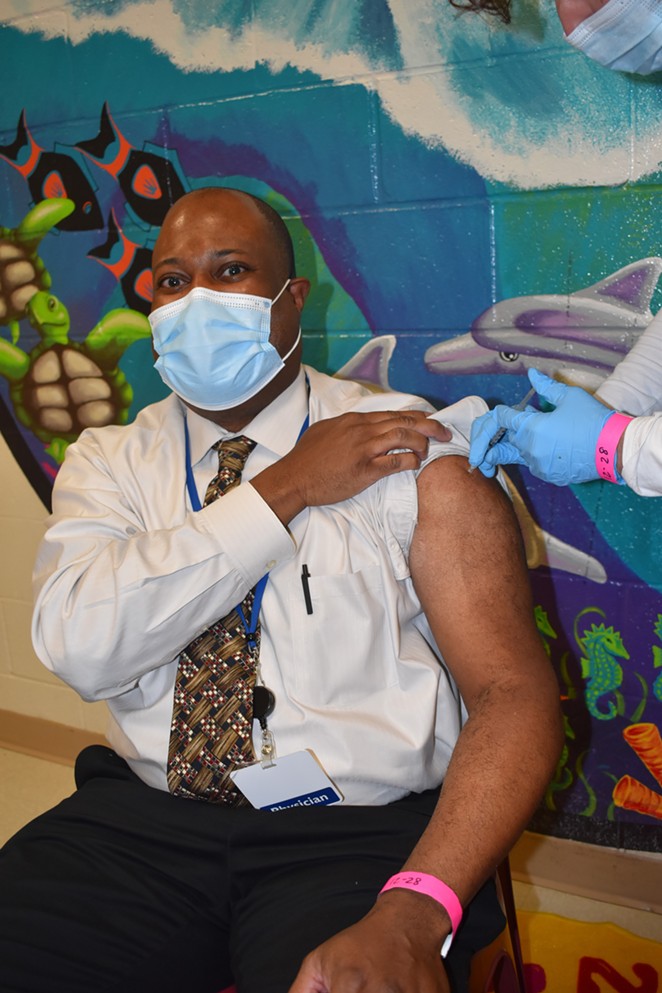Prisons present a unique challenge for enforcing COVID-19 health precautions because of the close quarters for inmates and staff. To try to address the issue, prison staff and AICs have been placed in Oregon’s Priority Group 1B for vaccination. This falls in line with the vaccine prioritization framework recommended by the Centers for Disease Control and Prevention, which puts people living in congregate or overcrowded settings in a group just behind the group with health care workers and first responders (Priority Group 1A).
The Oregon Department of Corrections received an initial shipment of 400 doses of the Moderna vaccine and expects “regular access to, and distribution of, additional vaccines in the future,” according to a Dec. 28 press release. The DOC operates 14 prisons across the state with approximately 13,000 adults in custody.
“Beginning Mon., Dec. 28, clinics were [set up] across the state, including at DRCI, to distribute the vaccine,” a spokesperson for the DOC told the Source via email. “We are happy to report that by Wed., Dec. 30 all 400 doses were delivered to staff.” As additional vaccines are available, they’ll be provided to more staff, contractors and AICs.

“The Vaccine Advisory Committee will consider how adults in custody fit into the 1B prioritization as they consider other groups to be included in the 1B category,” the spokesperson said. “Once that determination is made and communicated with DOC, we will work diligently to implement the distribution plan.” Vaccination is voluntary but encouraged.
As of Jan. 10, statewide 27 adults in custody have died after testing positive for COVID-19. There are 604 active cases in AICs statewide—25 at the Deer Ridge Correctional Institute in Madras.
tweet this
The DOC faces legal challenges for its COVID-19 response
The DOC’s COVID-19 precautions thus far have included suspending visitation to prisons. Since March 2020, all DOC prisons remain closed to visitors, volunteers and the majority of contract employees, according to a DOC spokesperson. AICs are staying together by unit, inmates are asked to keep 6 feet apart and group activities in the yards have been eliminated.
Despite these efforts and others, COVID-19 made it into the prisons. A lawsuit from the Oregon Justice Resource Center claims the DOC failed to do enough to protect inmates, and its Civil Rights Project Director, Juan C. Chavez, is working on a class-action lawsuit against the DOC and others over the handling of COVID-19 in prisons, according to Alice Lundell, OJRC’s director of communication.
The lawsuit seeks damages for inmates who allege that officials violated the Eighth Amendment—which protects people from excessive bail and fines and cruel and unusual punishments—and negligently responded to the coronavirus pandemic. Initially, the named-Plaintiffs were Oregon prisoners with pre-existing conditions or other factors that make them vulnerable to a serious COVID-19 infection, Chavez said. Since then, a few of them have caught COVID-19.
The OJRC was handed a victory in the case in mid-December when U.S. Magistrate Judge Stacie F. Beckerman rejected Gov. Kate Brown’s qualified immunity argument made during the discovery process. Qualified immunity would have meant that the state wasn’t responsible for the damages because the novelty of COVID-19 meant no previous case clearly established the appropriate constitutional response. But Beckerman sided with the inmates, ruling that the state had enough fair warning of its responsibility to protect them from increased exposure risk to COVID-19, and the case will move forward.
Chavez says DOC policies and the realities of what's happening in prisons don't always line up. For example, DOC's official line on testing is:The vast majority of people know how dangerous this disease is and have changed their lives to protect loved ones. Those opportunities were never offered to people who are incarcerated, not in Oregon. — Juan C. Chavez
tweet this
“AICs who would like to be tested or who are experiencing symptoms of COVID-19 can reach out to Health Services via staff member or by written communication. After a full assessment by Health Services, the AIC may be tested for COVID-19. If an AIC tests positive for COVID-19, the patient will be placed in medical isolation—and promptly transferred to an institution with 24/7 medical care, if necessary,” according to a DOC spokesperson.
“I’ve heard from the DOC that that’s their policy,” Chavez said. “But that just isn’t what we’ve heard from people.” He says AICs report that tests are rare, but that many AICs also don’t want tests because they’re afraid of how they’ll be treated if positive. “It’s no secret that AICs don’t want to be tested,” Chavez said. “They don’t want to be put in solitary confinement.” He says, “there’s a lot that’s bad about prison,” but that for most AICs, “nothing compares to solitary confinement.”
When asked if he thought prisoners would get the vaccine when available, Chavez said there needs to be better education about the value of vaccines and what will happen to the prisoners after vaccination.
“A lot of AICs have good reason to have grave distrust of DOC,” he said. For example, he says some AICs have expressed concerns that they are not going to be provided vaccines or that vaccines will not be administered correctly. Concern around how the system treated AICs who tested positive in the past may hinder vaccination efforts, too. For example, he says prisoners may worry that if they get vaccinated, and then later test positive for antibodies, they might be put in solitary.
With vaccines in short supply, not everyone may sympathize with prioritizing prisoners in Group 1B. But outbreaks at prisons can lead to infections in the community at large. Also, there are moral implications.
These prisoners were not sentenced to die of COVID-19, Chavez said. He “implores” people to think about how the treatment of prisoners “falls on our consciences.”
“The vast majority of people know how dangerous this disease is and have changed their lives to protect loved ones,” Chavez said. Those opportunities were never offered to people who are incarcerated—not in Oregon, he said.
Requesting that the Court certify the OJRC lawsuit is the next big step, Chavez said via email Jan. 12.
“That can be a complicated issue, and we had to gather and establish enough facts to support the argument that we’re addressing a class-wide issue,” he said via email. “If the Court denies us, that means that instead of ODOC facing one big class-action, they will be dealing with 2,800 and rising individual cases. That motion is due on March 1, 2021.”























